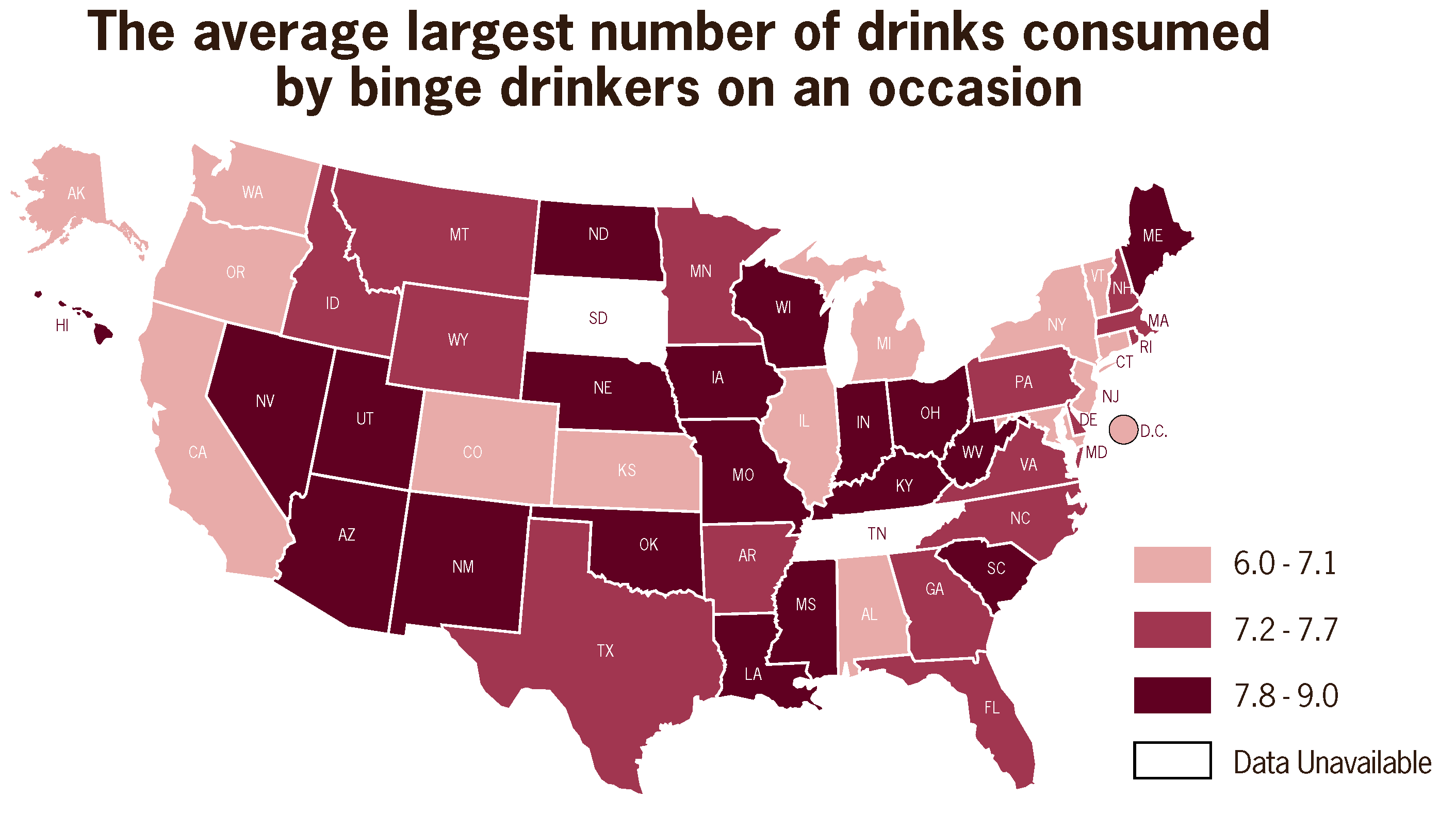Epidemiology of binge drinking
Epidemiology of Binge Drinking
Binge drinking, a form of alcohol abuse, is a pattern of drinking that brings a person's blood alcohol concentration (BAC) to 0.08 grams percent or above. This typically happens when men consume 5 or more drinks, and when women consume 4 or more drinks, in about 2 hours. The epidemiology of binge drinking involves studying the distribution, determinants, and deterrents of this behavior across different populations and settings.
Definition and Measurement[edit | edit source]
The definition of binge drinking varies globally, but in the United States, it is defined as consuming five or more alcoholic drinks (for men) or four or more drinks (for women) within a two-hour period. The Centers for Disease Control and Prevention (CDC) and other health organizations use this definition to monitor and study the phenomenon.
Prevalence[edit | edit source]
Binge drinking is a significant public health concern worldwide. According to surveys, it is most prevalent among young adults aged 18-34 years, but can also be observed across other age groups. Studies have shown that binge drinking is more common among males than females and varies significantly by region and country, influenced by cultural, social, and legal factors.
Risk Factors[edit | edit source]
Several factors contribute to the risk of binge drinking, including age, gender, socioeconomic status, and genetic predisposition. Young adults, especially college students, are at a higher risk due to social pressures and the availability of alcohol. Additionally, individuals with a family history of alcoholism or those who suffer from certain mental health conditions, such as depression or anxiety, are more susceptible.
Consequences[edit | edit source]
The immediate and long-term consequences of binge drinking are severe and multifaceted. They include health risks such as alcohol poisoning, liver disease, cardiovascular diseases, and neurological damage. Furthermore, binge drinking increases the risk of accidents, violent behavior, and engaging in unprotected sex, leading to unintended pregnancies and sexually transmitted diseases (STDs).
Prevention and Control[edit | edit source]
Efforts to reduce binge drinking involve policy interventions, community-based strategies, and individual counseling. Policies that regulate the availability of alcohol, such as minimum legal drinking age and taxation, have been effective in some regions. Community interventions that focus on changing social norms around drinking and increasing awareness about the dangers of binge drinking are also crucial. On an individual level, screening and brief interventions by healthcare providers have shown promise in reducing binge drinking episodes.
Conclusion[edit | edit source]
The epidemiology of binge drinking highlights its prevalence and the diverse factors that contribute to this risky behavior. Understanding the patterns and determinants of binge drinking is essential for developing targeted interventions to reduce its incidence and mitigate its impact on public health.
Transform your life with W8MD's budget GLP1 injections from $125
W8MD offers a medical weight loss program NYC and a clinic to lose weight in Philadelphia. Our W8MD's physician supervised medical weight loss centers in NYC provides expert medical guidance, and offers telemedicine options for convenience.
Why choose W8MD?
- Comprehensive care with FDA-approved weight loss medications including:
- loss injections in NYC both generic and brand names:
- weight loss medications including Phentermine, Qsymia, Diethylpropion etc.
- Accept most insurances for visits or discounted self pay cost.
- Generic weight loss injections starting from just $125.00 for the starting dose
- In person weight loss NYC and telemedicine medical weight loss options in New York city available
- Budget GLP1 weight loss injections in NYC starting from $125.00 biweekly with insurance!
Book Your Appointment
Start your NYC weight loss journey today at our NYC medical weight loss, and Philadelphia medical weight loss Call (718)946-5500 for NY and 215 676 2334 for PA
Search WikiMD
Ad.Tired of being Overweight? Try W8MD's NYC physician weight loss.
Semaglutide (Ozempic / Wegovy and Tirzepatide (Mounjaro / Zepbound) available. Call 718 946 5500.
Advertise on WikiMD
|
WikiMD's Wellness Encyclopedia |
| Let Food Be Thy Medicine Medicine Thy Food - Hippocrates |
Translate this page: - East Asian
中文,
日本,
한국어,
South Asian
हिन्दी,
தமிழ்,
తెలుగు,
Urdu,
ಕನ್ನಡ,
Southeast Asian
Indonesian,
Vietnamese,
Thai,
မြန်မာဘာသာ,
বাংলা
European
español,
Deutsch,
français,
Greek,
português do Brasil,
polski,
română,
русский,
Nederlands,
norsk,
svenska,
suomi,
Italian
Middle Eastern & African
عربى,
Turkish,
Persian,
Hebrew,
Afrikaans,
isiZulu,
Kiswahili,
Other
Bulgarian,
Hungarian,
Czech,
Swedish,
മലയാളം,
मराठी,
ਪੰਜਾਬੀ,
ગુજરાતી,
Portuguese,
Ukrainian
Medical Disclaimer: WikiMD is not a substitute for professional medical advice. The information on WikiMD is provided as an information resource only, may be incorrect, outdated or misleading, and is not to be used or relied on for any diagnostic or treatment purposes. Please consult your health care provider before making any healthcare decisions or for guidance about a specific medical condition. WikiMD expressly disclaims responsibility, and shall have no liability, for any damages, loss, injury, or liability whatsoever suffered as a result of your reliance on the information contained in this site. By visiting this site you agree to the foregoing terms and conditions, which may from time to time be changed or supplemented by WikiMD. If you do not agree to the foregoing terms and conditions, you should not enter or use this site. See full disclaimer.
Credits:Most images are courtesy of Wikimedia commons, and templates, categories Wikipedia, licensed under CC BY SA or similar.
Contributors: Prab R. Tumpati, MD





